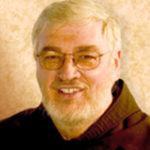
Readings:
Reading 1: 1 Samuel 3:3b-10, 19
Responsorial Psalm: Psalm 40:2, 4, 7-8, 8-9, 10
Reading 2: 1 Corinthians 6:13c-15a, 17-20
Gospel: John 1:35-42
The scene depicted in today’s gospel was not at all unusual among Jews of Jesus’ day. A principal duty of a rabbi was to “make many disciples.” These disciples stayed with their rabbi, learning his particular approach to the “law and the prophets.” Eventually, they struck out on their own and gathered their own group of disciples to continue the process of passing on Jewish religious tradition.
Jesus was among the many Jews who were attracted by the preaching of John the Baptist. The Baptist, in turn, recognized that Jesus was more than a promising rabbinical student. Jesus was someone quite special, and John said as much (John 1:29-30). Two of John’s disciples, upon hearing the Baptist’s testimony, attached themselves to Jesus. The new rabbi had his first two disciples. Eventually, Jesus attracted many followers, though, in the end, almost all abandoned him. Many ended their relationship with Jesus following his “bread of life” discourse (John 6:66). Of those that remained, one betrayed him (John 18:2), another denied knowing him (John 18:25-27), and the rest, except for the Beloved Disciple, Jesus’ mother, and some of Jesus’ female disciples (John 19:25-27), abandoned him in his final hours.
Jesus, however, did not abandon his disciples. After being raised from the dead, Jesus showed himself to his disciples, sending them into the world just as God had sent him (John 20:20-21). The once-fearful disciples’ experience of the Risen Jesus transformed them into committed and vigorous missionaries who took the gospel from Jerusalem to the ends of the earth, fulfilling their commission to “make disciples of all nations” (Matt 28:19).
The process of “disciple-making” continues. Indeed, Catholic Theological Union exists for this very purpose: to hand on the gospel to those who commit themselves to make more disciples. Not surprisingly, today’s disciple-makers have found that the road they must travel has twists and turns. They may find it difficult to continue the journey. What strengthens them is the community of disciple-makers, that is, the Church. Their decision to accept Jesus’ invitation to “come and see” (John 1:19) may have been an intensely personal one, but it can never be a purely private matter. Disciples follow Jesus together. They encounter the living Christ in Word and Sacrament together. They proclaim the Good News to the world together. The communal nature of disciple-making is not merely a practical strategy; it is at the center of the disciples’ calling and life.
Today’s gospel shows Jesus’ making disciples of two of the Baptist’s followers. It is the beginning of the Church, the community of disciple-makers. Andrew, one of the two, brought his brother Simon to Jesus. Eventually, they and Jesus’ other disciples invited others to believe in Jesus and live according to the ideals of the gospel. Those believers invited still others and so it went for two thousand years. The Church today is the result of the many generations of disciples who have gone on to make other disciples.
Disciple-making is not about handing on ideas, although Jesus is “the truth,” but he is also “the way” and “the life” (John 14:6). Words alone will not lead people to become disciples. There is no better way to make disciples than by living a life shaped by the ideals of the gospel. An authentic and effective disciple-maker is one who not only hears the word of God but acts on it. Acting on the word is the best way to “make many disciples.”
Rev. Leslie J. Hoppe, OFM
Professor Emeritus of Old Testament Studies